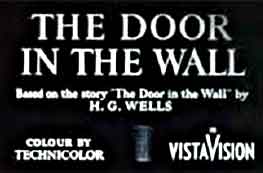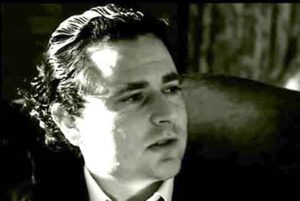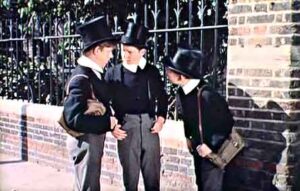A 1956 short from the BFI’s Experimental Production Committee that offered up a new, and never again utilized, innovation: The Dynamic Frame, in which the aspect ratio is shifted to serve “the dramatic needs of the story.” This film’s makers were evidently so enamored with the process they included an opening text touting it.
THE DOOR IN THE WALL (1956) Part 1
Adapted from a 1906 story by H.G. Wells, THE DOOR IN THE WALL consists largely of a chat between the middle-aged Londoner Henry Redmond (Ian Hunter) and his longtime friend Frank Wallace (Stephen Murray). The latter has attained enormous success, yet finds himself unable to get past a childhood incident in which he found a door incongruously situated in a brick wall. As depicted by extended flashbacks, the door led to an enchanted garden in which the young Frank frolicked with several children and met a woman who showed him a book in which images from his own life played on the pages. Frank was then thrust back to reality, which he found far less enchanting.
He subsequently passed by the door on his way to school but didn’t open it, instead drawing arrows on the wall to indicate its location. Frank was unable to locate the door and never again stepped through it, but assures Henry that he’ll be sure to do so should he ever find it again. Shortly thereafter Henry falls to his death after opening a door set in a wall, on the other side of which is a precipitous drop.
I’ve never seen this film in its intended big screen format, in which the shifting aspect ratio had its optimum impact. On the small screen the film is presented in windowboxed format, allowing us to experience the frame’s carefully modulated expansions and contractions (sometimes to pinpoint size a la the irises utilized in the silent era).
As to whether the Dynamic Frame format succeeds in enhancing the drama, I say nay. If anything, the constant reframing feels like a desperate gambit to liven up filmmaking that fails to convey the wonder and awe specified by Wells’ text (containing lines like “a happiness that filled his heart with insatiable longings that made all the interests and spectacle of worldly life seem dull and tedious and vain”).
Director Glenn H. Alvey, Jr. (1923-1980) has at least succeeded in crafting a fantasy that compels despite its shortcomings. Measured and refined, it’s a film that comes off like an especially British-centric episode of THE TWILIGHT ZONE.
Vital Statistics
THE DOOR IN THE WALL
Associated British-Pathe
Director: Glenn H. Alvey, Jr.
Producer: Howard Thomas
Screenplay: Glenn H. Alvey, Jr.
(Based on a story by H.G. Wells)
Cinematography: Jo Jago
Editing: Eily Boland
Cast: Stephen Murray, Ian Hunter, Leonard Sachs, Anne Blake, Malcolm Knight, Kit Terrington



